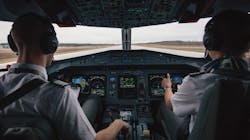BAA Training Is the First ATO to Launch Pilot Peer Support Program
BAA Training is the first ATO to launch a Pilot Peer Support Program (PPSP) that became mandatory for European operators on February 14, 2021. The regulation is restricted to airlines and does not extend to training providers. However, BAA Training decided to use an opportunity and contribute to creating an added benefit for its partner airlines and its own students and instructors. Since 2020, it has worked closely with Avia Solutions Group’s airlines, Avion Express and KlasJet, to develop a PPSP in line with the highest EASA standards from scratch. After carefully handpicking and training a pool of pilot peers from both airlines as well as configuring the systems, the program is fully functional at Avion Express and soon to be activated at KlasJet.
Egle Vaitkeviciute, BAA Training CEO, says: "The implementation of a PPSP will raise our entire Ab Initio training to a new quality level and increase the intrinsic value of services provided. While being fully committed to Avion Express and KlasJet PSP Oversight Committees and aligned with EASA regulation, the program will also be adapted to assist BAA Training’s students and instructors in a way that makes a real difference.”
Advantages of PPSP
The ultimate goal of a PPSP is to enable a pilot, their colleague or a family member to raise their concerns and receive professional support. The issues in question may range from work-related stress factors, such as inflexible schedules, inappropriate workload, both excessive and insufficient, conflicts with team members, etc., to personal suffering, such as grief, marital or family difficulties. The involvement of pilot peers guarantees confidentiality and a non-punitive environment where pilots can expect to be heard and not judged regardless of the situation they report. A friendly ear of those who have the same professional background and, in addition, are adequately trained is effective in resolving multiple problems before they reach a critical point.
Positive PPSP impact on pilot training
Besides providing knowledge and skills to its students and optimal working conditions and growth opportunities to its instructors, BAA Training will also advocate their emotional health. Both preparations to becoming a pilot and instructors’ work come along with many stressors. Students cannot afford to fall short on demonstrating a "can-do“ attitude to succeed, whereas instructors take on an exceptionally high degree of responsibility. Therefore, ensuring both trainers and trainees can ask for professional yet confidential support and be guided towards proper decision-making is no less important than the same services provided to flying pilots. Students will get access to the PPSP from day one of their flight training which they might find particularly challenging.
Agne Novikene, Competence Center Director at BAA Training, says: “The PPSP primarily aims to achieve credibility among a pilots’ society and help them realize that proactive search for support in the early stages of emotional and psychological issues in most cases can prevent more significant mental health issues. Sometimes a friendly and collegiate talk is enough to get back on track. We will encourage our students to take advantage of the program and the professional assistance. This way, they will have a chance to personally touch and experience what kind of programs their future employers – airlines – apply in practice. With early preparation for their future working environment, they will be stepping into a role of a pilot with great confidence and awareness. On a different note, we will also inspire our instructors not to keep silent whenever they find themselves confused or insecure."
PPSP program structure
At the center of the program are pilot peers, pilots working for Avion Express and KlasJet, who were shortlisted as the most suitable and trustworthy to take a leap of faith towards their colleagues. They are supervised by a Program Manager who is accountable for training, supporting and consulting the peers while also being in charge of the entire process. In exceptional circumstances and within the established procedure, a supporting mental health expert can also be involved. Operating under strict confidentiality conditions, the PPSP is wholly independent of the management, colleagues or groupmates of those who reach out for help.
PPSP program background
The new EASA regulation regarding the PPSP was pushed forward as a swift follow-up on the Germanwings Flight 9525 accident. In consultation with the broader aviation community, the regulator has introduced "the right tools to safeguard the mental fitness of air crew.“ On March 24, 2015, Germanwings Flight 9525 crashed in the French Alps, killing all the passengers and flight crew. The investigation later revealed that the crash was deliberately caused by the co-pilot, who had suffered from depression and had had suicidal thoughts without making his employer aware of his mental troubles. To prevent similar accidents, the PPSP encourages pilots to self-refer any psychological issues and solve them at early stages without fear of being excluded from rosters.


